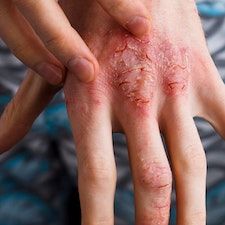Topical JAK Inhibitors Found to Be Effective, Safe in Atopic Dermatitis Treatment
New research into atopic dermatitis treatment indicated that topical JAK inhibitors were safe and effective, although more research is needed regarding adverse effects.

Topical JAK inhibitors (JAKi) were found to be both effective and safe for atopic dermatitis (AD) treatment in pediatric and adult populations, a recent systematic-review suggests.1
Both the innate and adaptive immune systems’ dysregulation affects AD profoundly, and JAKi have been shown to diminish the creation of cytokines that cause inflammation in the form of AD.
This study was conducted to assess the overall effectiveness and safety profile of topical JAK inhibitors on AD conditions for patients.
The review was authored by Sara Sadeghi, MD, from the Division of Dermatology, Department of Pediatrics at Alberta Children's Hospital in Canada.
“Oral and topical JAKi are promising therapeutic modalities in the treatment of moderate-to-severe AD,” Sadeghi and colleagues wrote. “Since the number of JAKi and their indications are rapidly expanding, this systematic review focuses on the efficacy and safety of topical JAKi in the treatment of AD.”
Research and Methods
The investigators conducted their systematic review through the use of the following databases, collecting information up until June of 2022:
- Ovid Medline
- Ovid Embase
- Cochrane Library
- Web of Sciences
- Scopus
- CINAHL
- Google Scholar
The team found a total of 1,784 publications for their review, and 2 investigators worked specifically on determining the studies’ methodological quality and their risk-bias.
The inclusion criteria determined by the investigators were as follows: English, full text, studies of humans, describe pediatric and adult AD cases, topical JAKi, clinical trials, cohort, case series, observational research, case reports, abstracts from conferences,
Exclusion criteria for the review were determined by the team to be studies that were experimental, other reviews, systemic JAKi-related (oral or injectable), articles without full text, and articles not describing either JAKi or AD.
Study Results
The investigators’ systematic search and subsequent screening resulted in the retrieval of 19 publications and data from 3600 participants in total.
“Topical delgocitinib, tofacitinib, ruxolitinib, cerdulatinib, and ifidancitinib are effective in treating AD and significantly improve EASI, IGA, pruritus-NRS score and some other indexes in adults,” they wrote. “Moreover, topical delgocitinib was observed to have a great efficacy in the treatment of AD in pediatrics.”
Based on their review, the investigators also determined that every topical JAKi had at least mild-to-moderate adverse effect risk.
Overall, they concluded that topical JAKi showed strong efficacy and safety in their use on AD, though the team added that more research with a longer duration and head-to-head comparative trials may be needed in order to determine which ones show the least adverse effects.
The team further elaborated that given the fact that topical JAKi are novel treatments, further research may be necessary to assess their safety and efficacy in a variety of skin conditions and especially with younger populations.
This is especially attributed to the fact that pediatric patients are some of the most impacted individuals with AD.
References:
- Sadeghi, S. and Mohandesi, N.A. (2023), Efficacy and Safety of Topical JAK inhibitors in the Treatment of Atopic Dermatitis in Pediatrics and Adults: A Systematic Review. Exp Dermatol. https://doi.org/10.1111/exd.14753.